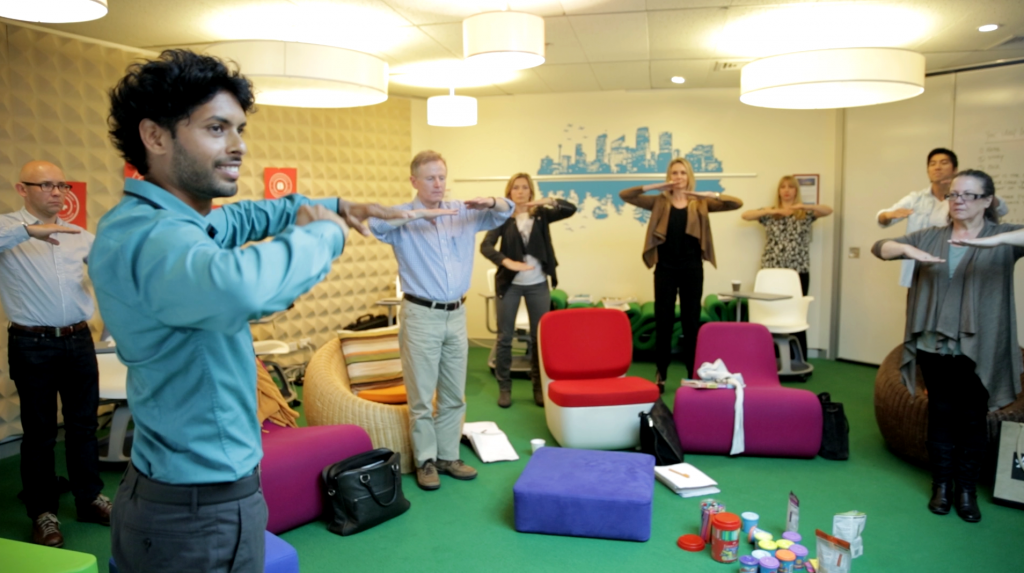Key Insights From An i4 Practitioner For Creating A Brain-Friendly Culture
Two years ago, I made the decision to become certified in the i4 Neuroleader Assessment and Methodology. I chose this tool over others because I felt it most accurately reflected and assessed the behaviours, traits and abilities people require to lead and manage change in current 21st century workplace environments.
I truly believed this  was a great addition to my toolkit. It was by far the most innovative assessment tool I had come across in my career, it was backed by neuroscience and I was excited about the possibilities it could bring to the people I worked with.
was a great addition to my toolkit. It was by far the most innovative assessment tool I had come across in my career, it was backed by neuroscience and I was excited about the possibilities it could bring to the people I worked with.
My decision was validated when a top CEO client chose the  over other popular leadership models and assessments he had used in the past to embark on an organisation wide ‘Creating a Brain-Friendly Culture’ program.
over other popular leadership models and assessments he had used in the past to embark on an organisation wide ‘Creating a Brain-Friendly Culture’ program.
In the past 18 months I have had the privilege of consulting on this project, working with teams and individuals across the organisation. Does ‘privilege’ sound cliche? Perhaps, but I do not take the word lightly. The impact that I have seen this program have, on individuals and the collective, has been nothing short of amazing.
So what Is A ‘Brain-Friendly Culture’?
According to  , creator of the i4 Neuroleader Model & Methodology, a brain-friendly culture is:
, creator of the i4 Neuroleader Model & Methodology, a brain-friendly culture is:
Understanding the relationship between our biological system and our behaviours, and being willing to action this new knowledge in order to improve how we interact with one another and how we deal with busy, complex and stressful environments.
Creating Brain-Friendly Cultures in organisations is important at a global level for our economy because it raises the bar of organisational effectiveness, productivity and innovation. It’s important at a local level for businesses because it drives competition.
We are now beyond the information age where knowledge was the currency of a business. We are now working in the imagination age, where ideas are the new currency.
Organisations need to have people working within them, with their brains and bodies performing at their best, so they can be creators, innovators and collaborators of ideas and concepts and at the same time be agile in the way these ideas are executed. If we ignore this, our people and our organisations will become stagnated, ideas and innovation will not occur and competitive edge will be lost.
It’s also important because creating a brain-friendly culture means not just looking at and improving the health of the organisation but the health and wellbeing of the individual is also taken into account.
Using the  , the performance of their brain-mind-body system is assessed and areas for improvement are clearly recognised. I’m yet to see another assessment tool that measures and develops these areas.
, the performance of their brain-mind-body system is assessed and areas for improvement are clearly recognised. I’m yet to see another assessment tool that measures and develops these areas.
Adjusting To A New Way Of Being
Creating a brain-friendly culture means adjusting our current reality to new ways of being and working. This requires the development of new mindsets and behaviours that we may not have used in the past.
The i4 Model was developed specifically to create brain-friendly leaders, teams and cultures with the purpose of addressing the challenges of 21st Century work environments.
These new environments and conditions tend to be volatile, uncertain, complex and ambiguous, placing excessive demands on the performance of leaders, the quality of their relationships and the level of success in their businesses.
While the  is the framework that outlines the meta-competencies of Performance, Collaboration, Innovation and Agility, the
is the framework that outlines the meta-competencies of Performance, Collaboration, Innovation and Agility, the  follows a series of principles designed to gear people up into developing these meta-competencies, all with the purpose of achieving an improved sense of well being and a higher level of effectiveness which benefits the organisation and benefits the individual as well.
follows a series of principles designed to gear people up into developing these meta-competencies, all with the purpose of achieving an improved sense of well being and a higher level of effectiveness which benefits the organisation and benefits the individual as well.
Key Insights for Creating a Brain-Friendly Culture
Below I have outlined the main insights from the process I undertook when using the i4 Neuroleader Model & Methodology at Ultraceuticals.
About the i4 Assessment
The i4 Neuroleader Assessment, is crucial in raising awareness at the beginning of the cultural change journey for the individuals. Without awareness, there can not be growth. People need a baseline measurement of how they are perceived by their stakeholder groups vs how they see themselves. There are up to 8 stakeholder rater categories and something that is very unique about this assessment is that it includes family and friends.
Holistic Feedback
The feedback results in the family and friends category facilitate very powerful conversations in the debrief and subsequent coaching sessions - exploring these results has given participants a deep insight into how they show up at work vs how they show up in other areas of their life and how this could be limiting their potential and performance either way.
Easy To Apply Strategies
Participants on the program are amazed at how simple the changes can be to improve their results in the competency areas. There is a wealth of insight in the i4 Assessment results and once participants understand how their brain works and how it affects their behaviour, they can see a path ahead for change and growth.
For example, they are not just being told ‘you need to be less reactive, so go off now and be less reactive’ they are actually shown how, through understanding how their brain operates under stress and a series of practical actions they can take to alleviate this. (CFO’s are also amazed and delighted that the recommendations and actions come so freely and do not cost an arm and a leg!)
Performance At The Core Of Change
Performance absolutely needs to be the competency that is addressed first for each person on the program. Without addressing sleep, diet, stress and overwhelm, the other competencies of Collaboration, Innovation and Agility cannot be developed to their full extent.
Participants who I have observed to have had a dramatic improvement in their leadership capability and effectiveness are the ones who have acknowledged their limitations in Performance and used this new awareness along with the i4 Neuroleader Curriculum to work with their coach to transform the limitations into strengths.
A Personal Leadership Journey
This is a personal leadership model so participants have a profound understanding on not just how this impacts them at work but at home as well. Their personal relationships are also improved. Participants overall well-being is also enhanced because they have a new brain-body awareness and are empowered to take better care of themselves.
Neuroplasticity & Change
Changing habits takes time, however is possible when you use neuroplasticity principles to guide the change. Participants develop an understanding of this straight away as part of the learning. Due to this, they don’t feel pessimistic when they slip up and revert back to old behaviours - they know it’s their brain reverting back to old habits and that overtime the newly developed neural pathways will take over.
Engaging Everyone
Engaging the entire organisation encourages and supports the change. Bulletin boards, intranets and every single company meeting can be used as a stage to update the organisation on where the program is at and the impact it is having, using the results of scheduled pulse surveys on the brain-friendly commitments. Regular WIP’s and updates to the CEO and board if applicable also champion the change.
Adapt, Adapt, Adapt
Be prepared to pivot. Whilst the change was structured in 2 stages for this organisation, as a consultant either internal or external, you need to adjust what you do to the needs of the organisation as the journey progresses. Because we live and work in a Volatile, Uncertain, Complex and Ambiguous world, a VUCA world, curve balls will be thrown and true to the model, you will have to be agile and adapt.
---
To read more about the Ultraceuticals Case Study, click here.
- i4 Neuroleader (353)
- Leadership & Culture (336)
- Brain Health & Wellbeing (206)
- Innovation (97)
- Performance (85)
- Our News (79)
- Collaboration (68)
- Agility (53)
- Practitioner Stories (44)
- In The Press (36)
- Make Me A Leader (33)
- Balance (31)
- Integration (30)
- Imagination (29)
- Awareness (23)
- Brain-Friendly Channel (22)
- Brain-Friendly Leadership (22)
- Communication (22)
- Curiosity (21)
- Inspiration (19)
- Intuition (19)
- Attitude (17)
- Courage (16)
- Adaptability (14)
- Case Studies (14)
- Drive (14)
- Generosity (13)
- Ethics (9)
- Mental Readiness (9)
- Influence (8)
- Retreat (8)
- Brain-Friendly Leadership (1)
- Oracle Cards (1)
- 1 November 2025 (2)
- 1 September 2025 (3)
- 1 August 2025 (5)
- 1 July 2025 (5)
- 1 June 2025 (2)
- 1 April 2025 (1)
- 1 March 2025 (8)
- 1 February 2025 (3)
- 1 September 2024 (4)
- 1 July 2024 (2)
- 1 June 2024 (6)
- 1 May 2024 (2)
- 1 April 2024 (3)
- 1 March 2024 (1)
- 1 November 2023 (1)
- 1 August 2023 (1)
- 1 July 2023 (2)
- 1 June 2023 (2)
- 1 May 2023 (4)
- 1 April 2023 (2)
- 1 March 2023 (7)
- 1 February 2023 (4)
- 1 January 2023 (1)
- 1 September 2022 (1)
- 1 May 2022 (3)
- 1 April 2022 (1)
- 1 March 2022 (5)
- 1 February 2022 (4)
- 1 January 2022 (4)
- 1 December 2021 (2)
- 1 November 2021 (4)
- 1 October 2021 (3)
- 1 September 2021 (6)
- 1 August 2021 (1)
- 1 April 2021 (1)
- 1 December 2020 (2)
- 1 November 2020 (1)
- 1 September 2020 (1)
- 1 August 2020 (1)
- 1 July 2020 (3)
- 1 June 2020 (4)
- 1 May 2020 (3)
- 1 April 2020 (4)
- 1 March 2020 (6)
- 1 February 2020 (4)
- 1 January 2020 (2)
- 1 December 2019 (3)
- 1 November 2019 (3)
- 1 October 2019 (5)
- 1 September 2019 (4)
- 1 August 2019 (4)
- 1 July 2019 (4)
- 1 June 2019 (5)
- 1 May 2019 (9)
- 1 April 2019 (9)
- 1 March 2019 (8)
- 1 February 2019 (7)
- 1 January 2019 (8)
- 1 December 2018 (5)
- 1 November 2018 (10)
- 1 October 2018 (16)
- 1 September 2018 (9)
- 1 August 2018 (10)
- 1 July 2018 (9)
- 1 June 2018 (8)
- 1 May 2018 (9)
- 1 April 2018 (9)
- 1 March 2018 (9)
- 1 February 2018 (8)
- 1 January 2018 (8)
- 1 December 2017 (6)
- 1 November 2017 (9)
- 1 October 2017 (9)
- 1 September 2017 (8)
- 1 August 2017 (10)
- 1 July 2017 (8)
- 1 June 2017 (8)
- 1 May 2017 (9)
- 1 April 2017 (8)
- 1 March 2017 (6)
- 1 January 2017 (3)
- 1 December 2016 (4)
- 1 November 2016 (5)
- 1 October 2016 (4)
- 1 September 2016 (2)
- 1 August 2016 (4)
- 1 July 2016 (4)
- 1 June 2016 (2)
- 1 May 2016 (3)
- 1 April 2016 (3)
- 1 March 2016 (7)
- 1 February 2016 (2)
- 1 January 2016 (5)
- 1 December 2015 (2)
- 1 November 2015 (2)
- 1 October 2015 (4)
- 1 September 2015 (2)
- 1 August 2015 (2)
- 1 July 2015 (1)
- 1 June 2015 (3)
- 1 May 2015 (4)
- 1 April 2015 (5)
- 1 March 2015 (3)
- 1 February 2015 (3)
- 1 January 2015 (3)
- 1 December 2014 (3)
- 1 November 2014 (3)
- 1 October 2014 (3)
- 1 September 2014 (5)
- 1 August 2014 (4)
- 1 July 2014 (5)
- 1 June 2014 (3)
- 1 May 2014 (1)
- 1 March 2014 (1)
- 1 December 2013 (2)
- 1 November 2013 (1)
- 1 July 2013 (1)
- 1 June 2013 (1)
- 1 May 2013 (3)
- 1 April 2013 (1)
- 1 March 2013 (2)
- 1 February 2013 (1)
- 1 January 2013 (2)
- 1 November 2012 (1)
- 1 October 2012 (1)
- 1 September 2012 (1)
- 1 August 2012 (2)
- 1 July 2012 (1)
- 1 June 2012 (1)
- 1 May 2012 (2)
- 1 April 2012 (1)
- 1 February 2012 (1)
- 1 January 2012 (1)
- 1 November 2011 (1)
- 1 October 2011 (3)
- 1 September 2011 (2)
- 1 July 2011 (1)
- 1 June 2011 (1)
- 1 May 2011 (1)
- 1 April 2011 (1)
- 1 March 2011 (1)
- 1 February 2011 (2)
- 1 January 2011 (4)
- 1 December 2010 (4)
- 1 November 2010 (3)
- 1 October 2010 (5)
- 1 September 2010 (4)
- 1 August 2010 (4)
- 1 July 2010 (3)
- 1 June 2010 (4)
- 1 May 2010 (7)
- 1 April 2010 (5)
Subscribe by email
You May Also Like
These Related Stories

Bring Balance Back to Your Life with the i4 Neuroleader Model

Creating a Brain Friendly Culture At Ultraceuticals



No Comments Yet
Let us know what you think